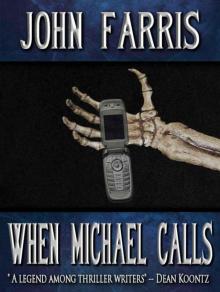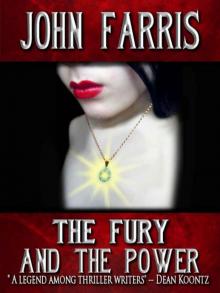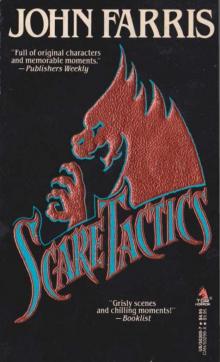- Home
- Farris, John
Captors Page 10
Captors Read online
Page 10
The view was all it should have been, from the blue Pacific slash beyond Muir Woods to Tiburon and the sun-glazed North Bay. The park wasn't crowded on a weekday so we did some walking. I began to feel a little sorry I wasn't staying in California. But after the four years I had begun to miss the tension and gritty competitiveness of New York. A classic case of hometown nostalgia, I suppose.
A funny thing happened. Two big, glossy, crotchety ravens, each more than two feet long, suddenly swooped down across our path. They began walking around in circles, impeccable as bankers, bobbing their heads and carrying on about something.
You don't often see them that close—they're reclusive birds. They weren't more than forty feet away. Maybe they weren't aware of us because we were standing in the shade. There was something noble and awe-inspiring about these two. Tribes of coastal Indians once considered them to be gods. I've always been something of a bird watcher and I like them all, even the goshawks and peregrine falcons the General keeps for sport—but I prefer falcons from a distance, not eye-to-eye.
Apparently Sam doesn't care to be eye-to-eye with any bird. I turned to suggest we try to move a little closer to find out what the ravens thought of us and there was Sam, making tracks down the path, going back the way we'd come. But he was walking stiffly, jerkily. He stumbled and I caught up to him. His color had gone bad and his face was squeezed up as if he'd just swallowed something poisonous. I spoke to him; like a sleepwalker he kept going for another twenty yards or so. Then he stopped and hunched his shoulders and mopped his forehead with a handkerchief.
"Sam, what's the matter? Are you sick?"
He tried a smile. We were out of sight of the ravens. "I didn't know you were afraid of birds," I said.
He shook his head as if he were baffled by his reaction. "I'm not," he said. "I mean, I haven't been for years. I thought I was all over that."
On the way back to the car I got him to explain. It had to do with Sam's uncle, of course, the one who had raised him. Uncle Hat, he was called, because he had no hair and caught colds easily, so he wore something on his head all the time, even in bed.
Which makes him sound sort of quaint and folksy, but he was a complex and tortured man. Self-educated, a talented amateur musician, he worked all his life at unskilled jobs. He was devoted to his wife and daughter, particularly the daughter, who (according to Sam) was an accomplished bitch by the time she was fifteen. Apparently old Hat was sexually hung up on his daughter, and she all but drove him crazy. Occasionally Hat would erupt, outbursts of sadism. Sam was always the victim.
Sam was only eight the year his uncle worked for the zoo. There was nothing to the job; Hat was a night watchman, with a slightly more prestigious title.
The daughter was in the hospital for a minor operation, tonsils or something, and the mother was staying all night with her. Instead of paying a few dollars to a babysitter, Uncle Hat took Sam with him to the zoo.
Like any boy would, Sam got bored in the office where Hat had stashed him and he wandered out to see the animals. It was a good-size zoo and he managed to get lost. Hat was furious by the time he located Sam.
A whipping was in order, but Hat believed in unusual punishments. He dragged Sam to the birdcage, unlocked a door, shoved him inside.
The birdcage covered half a city block and was four stories high. The climate and lighting were controlled, simulating a tropical jungle. Sam found himself in near-darkness with a thousand exotic birds for company, all of them irritable and screeching at him. He was in a mortal panic to get out of there. As he was blundering around he fell into a shallow pool and was cut by the sharp fronds of some tropical plants. He thought the birds were attacking him. By the time an assistant curator heard him screaming and pulled him out of the birdcage Sam was off his rocker. It took shock therapy to bring him around, a year as an outpatient at a psychiatric clinic to get him back to normal. Hat lost his job, of course, but criminal charges against him were dropped. Unfortunately.
We were tired after Tamalpais and talked very little on the way to Berkeley. When he dropped me off Sam leaned over and kissed me on the forehead. His eyes were terribly sad. I guess he was still thinking about that little boy in the birdcage. Or maybe he was thinking about Dev.
"Things work out for the best," he said tritely, almost sounding maudlin. But the emotion in his voice was genuine. "Remember that you mean a lot to us." He seldom lets his emotions show, and I was touched. This Sam is quite a guy. I hope Felice realizes it in time.
Mar. 20
Broke down today and wrote to Dev's sister; I told her I had some papers of Dev's which he'd overlooked when he was cleaning out his file at the Physics Dept. I just want to know where he is and how he is, and Jean is my only hope there. Probably Dev is just fine. The son of a bitch.
Mar. 27
Lone has a new boyfriend.
I shouldn't say new; I have the impression he's known her for a couple of years, and has wandered in and out of her life. But he seems to have made up his mind that Lone is for him; he's sticking very close to her. It's hard to say if Lone is in love with him. She's remarkably alive, all juices flowing; sexually the relationship must be very good. But there's a puzzling kind of tension between them: Lone is almost too eager for his approval. That's not like her.
His name is Richard Marsiand. Lone calls him Rich. My first reactions to him were all negative. He's a perfect stud type: big, rangy, with a square face and small ears and knobbly cheekbones, a surefire grin. His hair is surfer wild, chopped like spinach. He is older than he seems: I'd say early thirties. He's spent a lot of time on the beach because he has the coloring, a raw splotch or two where skin ulcers have started, a permanent sun squint. No eyes visible at all, just shadowy niches under a tawny overhanging of brow. I figured an IQ of possibly one hundred, giving away a few points in a fit of generosity.
The first half hour or so after we met he didn't say anything to reflect on my judgment. He said nothing at all, just sat, nicely self-contained, and grinned from time to time while Lone and I chatted. He wasn't giving me the automatic stud business, so in that respect he wasn't true to type.
I made a couple of attempts to include him in the conversation, including the usual what-do-you-do-with-yourself gambit. I expected he worked a tuna boat or sold skis in season.
He said, with that wide utterly relaxed grin, "I'm an injustice collector."
I decided that I'd fairly let myself in for the put-on, so I asked the right questions to give him a chance to complete his routine and braced myself. Lone looked dead serious, damn her.
When her boy Richard started talking in earnest, I jumped his IQ fifty points immediately, and occasionally added a bonus often. Liar or not, he was by no means existing on a dab of brains.
He'd learned the brokerage business while taking a PhD. in Business at UCLA. Even before finishing his schooling he began a hedge fund with three other young brokers; within four years the twenty percent fee for managing the wildly successful fund had made them all millionaires. Rich Marsland retired at the age of twenty-seven.
For a while he did nothing except travel around, hitchhiking mostly, looking at things, listening to people. He listened to what was wrong with them, and what they thought was wrong with everybody else. He came to some perfectly ordinary conclusions: people are, on the whole, badly served by the institutions they have erected and are forced to support. Their governments make empty gestures and false commitments while chewing up vital resources. Most schools are an insult to native intelligence. And so on. There was one intriguing conclusion: bad institutions are directly responsible for mutations of the human spirit. They breed monsters who ultimately will become powerful enough to destroy humanity, for the sake of this ideal or that inalienable right.
The problem, then, in the name of humanity and common sense, is to do away with institutions altogether, or break them down to the point where they can be operated with complete integrity. A primary function of the institution, however, i
s to protect itself, at any cost, from dissolution. Violent revolution as a means is not justifiable because of the human suffering involved; and the end result is new institutions, which in time become as intolerable as the old.
Uh-huh, I said, still wondering what he was getting at.
"With a few other people I've spent the past couple of years studying the common characteristics of institutions, seeking ways to ethically destroy them. Of course this has to be done without dislocating the culture and inviting anarchy."
"Is there a way?" I asked.
He shook his head emphatically, showing not a trace of humor. "No."
"Chalk up two years," I said, and laughed, because he'd had me on pretty good, and he smiled then, just a little. Lone didn't smile or say anything right away, but she looked rather urgently at him, as if she was excited by the arcane philosophy he'd been handing out.
"Why don't you tell her about—?"
"No," Rich said, thoughtfully. He was staring straight at me. Then Lone, chastened, sneaked a glance, sort of a guilty glance. I felt damned irritated with both of them; for no reason I could define I decided again that I didn't care for Richard Marsland. But he's Lone's problem, not mine.
April 5
A variation on The Dream again. This time the baby wasn't in the nursery when I went to look, and Dev was so nonchalant I knew he'd taken the baby away. I made him tell me. He said it just wouldn't do for us, a baby at this particular time, his family would not approve, therefore he had done the sensible thing and given our baby to a Chinese family living on a junk in San Francisco Bay. He said they needed the baby and we didn't. He made this sound so plausible that I had to agree with him. But I missed the baby terribly—it was a blonde little girl, with immense plum eyes—and so I sneaked off and went down to the bay. I knew I could find the Chinese junk without trouble, and be with my baby for a while. But when I got there the bay was as crowded with junks as Hong Kong harbor, all of them looking exactly alike.
I woke up from that one at dawn with only a mild case of the shakes and I thought I'd forget about it soon enough and go about my business, but it didn't work out that way. I knew what was prompting The Dream. When Dev and I started really having troubles and I realized what might happen to us I thought about tying him down that way, skipping the pills at the critical time. I'm ashamed that I would have considered it for even a second. I was getting desperate, but that doesn't excuse me. To use Dev that way, use a child— Before long I was in a muck of self-loathing.
The day just got worse and worse. I wandered purposelessly around the sunny campus with my hair tangled, wearing a dress that should have been ironed, muttering to myself, maybe, like Ophelia with Hamlet's scorn echoing inside her naïve little head. At last, Ophelia…
I was suicidal, for the first time in my life, and that was no surprise at all. The idea of it seemed inescapable if not particularly welcome. It seemed like a justified act of atonement for my essential loathsomeness.
The Berkeley hills were April-green, the campus was spilling over with rhododendron and azalea under a wafer-crisp blue sky and there was a salt breeze along University Way. And it had become too much trouble for me to think, to see, to breathe. I understood them all very well, the leapers and drowners and pill swallowers. It was no great decision, accompanied by waves of self-pity and cymbal clashes. No tragedy, no loss. You just reached a point where you had to turn out the light and accept the dark, and whatever came with it.
I took my newfound wisdom to the Campanile and rode up in the elevator. Once upon a time the self-destructive ones who couldn't waste time getting to the Golden Gate Bridge used the Campanile tower for their dives, so the authorities glassed in the observation room. I had no immediate plans for doing myself in, just knew it must happen soon. At the moment I wanted to get away from the streets, I needed something resembling an ivory tower. The Campanile was noisy but convenient.
I spent a lot of time walking around slowly, looking out over the East Bay, deciding how I was going to do it. Accept the dark.
It gave me quite a start a few minutes later to realize I was no longer thinking of my essential loathsomeness. I was thinking about washing my hair.
Leap and drown, or swallow pills. Or a quick jerk of the razor blade at the wrist, and lean forward over the lip of the bathtub like that friend of Beth's a couple of years ago, poor frenzied kid.
I yawned, and wondered when I had washed my hair last. It was cozy up there in the observation room. And I caught sight of myself reflected vaguely in the sun-warmed glass, the blue bay in the distance. Loathsome, I thought. I yearned to go sailing.
The Campanile carillon kicked off on the hour and a couple of kids nearby squealed and grabbed their ears.
Standing that close to so many bells has different effects, depending on your mood, I suppose. Today, for me, it was like being slapped, many times, roughly but compassionately, by someone who knows the body needs a careful mauling from time to time. And the music the bells made was strong music, to drive out devils. Soon I was crying and hiccupping and not caring much what anyone might think.
With or without Dev, damn it, I wanted to live! I was going to live.
Chapter Ten
Saturday, June 29
Mike Sills and Virgil Munday clouted the car, a '65 Mercury, from the off-alley parking lot of the Shawmore Garden Apartments in Norwalk at six-fifty Saturday evening. It was raining then, and it kept on raining while Mike drove up to Bridgeport to see a couple of girls he knew. The girls weren't around so Mike and Virg hunted up a quickie grocery and Virg kept the proprietor looking the wrong way while Mike loaded up with cold beer and walked out with it under his slicker. They drove back to the girls' apartment house and drank most of the beer in the car while they waited. But the girls never showed.
"The hell with it," Virg said. He was fifteen and they'd let him out of the Home a few days ago. "I hate this goddam town. Let's go."
"Go where?" Mike said. "Back to Norwalk?"
"Shit, no, man, what's in Norwalk?"
"Good question. OK, then, Buffalo."
"Buffalo?" Virg said, startled. "You crazy? Why Buffalo?"
"I got a sister in Buffalo."
"Yeah, and I got a sister in Floral Park, but I don't want to go to Floral Park. Let's head south and see what happens. Maybe we'll make Miami. I hate this goddam ram."
"Look, in Buffalo we can get rid of this Merc. My sister'll know somebody give us a price on it."
"How much?"
"It ain't in such bad shape. Four, five hundred."
"Hey."
"Sure."
"Where the hell is Buffalo anyway?"
"We can make it by morning easy," Mike promised. "Sooner."
"Maybe she'll put us up for a while."
"Sure, Gwen digs me."
"Maybe she's got a friend I can screw."
"You can screw Gwen, long as you don't tell her how old you are."
"It ain't how old I am that counts," Virg said, scowling manfully. "But if she looks like you I wouldn't want her anyway."
What with getting lost and avoiding tollways it took them more than two hours to reach the Hudson. A few miles east of the Tappan Zee Bridge Mike pulled off and consulted a map he'd found in the dash compartment. After a hell of an argument he persuaded Virg it was worth fifty cents to use the bridge, it would save them a lot of time. And chances were nobody was looking for the car just yet. By then it was past two in the morning. A new storm was peaking over the Hudson and rain had begun to fall again, making coin-size splashes on the windshield.
A State Police car was parked near the tollbooths but the trooper in it hardly gave them a glance. Yellow warning lights were blinking on the long humpbacked bridge and, halfway across, rain and wind began to buffet them. Mike swore, finding it hard to see and steer. The interior of the car was a steambath, but opening a window even a crack let in a flood. He wondered if Buffalo had been such a great idea after all. At least this time of the night the
Thruway was all but deserted.
Mike was going sixty and the rain was really hitting; he could feel how unstable the back end of the Merc was at that speed, with the roadway awash. But it didn't matter, he just wanted to be somewhere, and if the goddam car fishtailed into an overpass abutment he didn't care about that, either; let it.
The high beams picked up a hitchhiker beside the road maybe a hundred yards away. Mike had to look twice and change his mind about what he was seeing and then he hit the brakes too hard. The Merc fought the road and the water and just didn't skid out of control. By then they were practically on top of her. Virg shouted something irritable at him. He'd been dozing.
"Take a look," Mike said.
She was walking on the shoulder, well in from the edge of the road but still shying from the lights. They saw drenched blond hair and a man's shirt pasted to the body so thoroughly it had no color of its own, and tanned bare legs.
"Well, Jesus," Virg muttered as the girl strolled past, pretending not to notice them. He rolled his window down a couple of inches. "Hey, baby!" he shouted, getting a faceful of rain. She didn't hesitate or turn her head. Momentarily her wet body was bathed in pink from the brake lights, and then she was swallowed up by rain and darkness.
The two boys looked at each other.
Mike said, "I don't know, maybe she was in a wreck."
"Pull off."
Mike drove onto the hard-surfaced shoulder. Virg opened the dash compartment and took out the flashlight he'd noticed earlier. He grabbed his slicker from the back seat, worked his way into it, got out of the car. It wasn't a hell of a good flashlight, weak batteries probably, and he couldn't pick her up with the beam. Too late he remembered he was wearing new shoes. He cursed and slogged in the direction the girl had gone, aiming the flash. After twenty yards or so, the back of her slicked, blonde head became visible.

 Sacrifice
Sacrifice Wildwood
Wildwood Fury
Fury Captors
Captors When Michael Calls
When Michael Calls Fury and the Power
Fury and the Power Dragonfly
Dragonfly Scare Tactics
Scare Tactics